Achu and Yellow Soup, Traditional Delicacy Recipe: Village Lifestyle
Steem greetings all the way from the motherland-Cameroon and welcome to my blog as I share the recipe for our traditional delicacy (achu and yellow soup). Cameroon happens to have the most complex cuisine in the world with varieties of traditional delicacies due to the over 250 ethnic groups with each having a traditional delicacy.
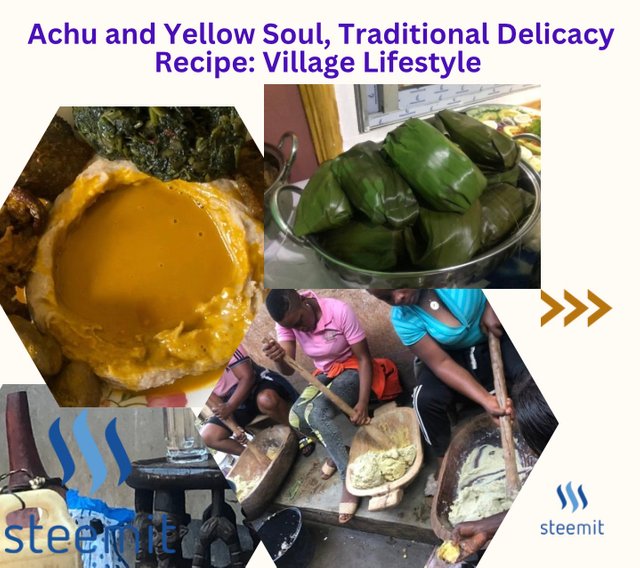
Most often I talked about this meal but I have never shared the recipe. Maybe because it requires a lot of time and energy to prepare. However, in the past, the process of preparing the meal is energy sapping but presently, the process is somehow easy due to the availability of modern machines to grind the cocoyam and banana.
These machines are commonly used within urban cities by working-class women. Within the village setup, they believe that pounding it the local way gives the food a unique taste and texture than grinding it with the machine.
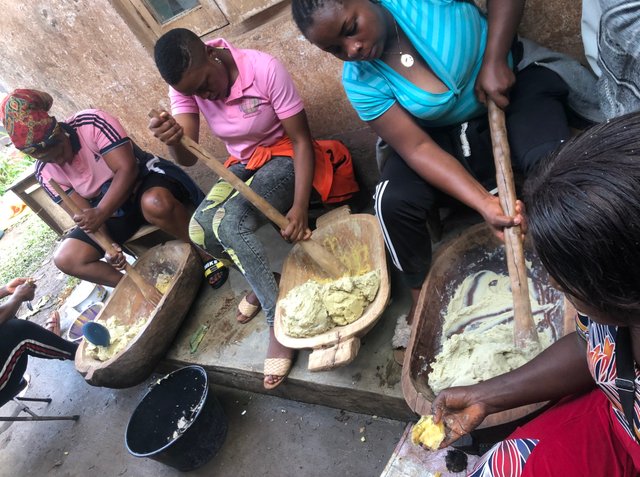
The question many will ask is what is achu and yellow soup? ask not because I will explain all that you need to know about the meal and in case of any further doubts I will respond to all that in the comment section.
Achu is a combination of different species of cocoyams and a special contri banana boiled, peeled and pounded into a smooth paste. While the yellow soup is a combination of palm oil, limestone (kanwa), Maggie, salt, beef and a variety of spices with hot water to make the yellow soup. What makes the soup yellowish is the combination of limestone and palm oil in hot water.
That said, below I will share the ingredients required and the process of preparing the meal.
Ingredients Needed.
- Cocoyam
- Green achu banana
- plantain leaves
- palm oil
- Kanwa(limestone)
- Smoked Beef (you can use a variety)
- Canda
- maggi
- salt
- Spices (most of the spices I do not actually know the real names but I know them when I see them)
The Process of Preparing Achu and Yellow Soup.
Step 1
You can harvest your cocoyam or buy it from the market. For us most often we harvest it from the farm. As for the banana, we also harvest from the farm but there are seasons of scarcity we buy from the market.
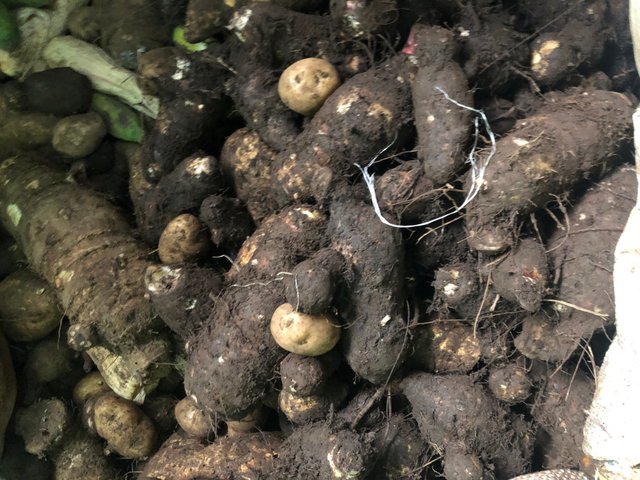

Step 2
Wash the cocoyams and put them in a pot. Add a litter or two of water depending on the species of the cocoyams because some require much water to cook for a longer period before they are ready to pound. Boiled on high heat for about 45 minutes add the green banana and continue boiling for about 40 minutes until they are ready to start the pounding. Peeled off before pounding. Note that you are not supposed to use ripe bananas else the end product will be sweet and will not give the required taste.
Step 3
When done with the pounding of both cocoyam and green bananas, mix both together and add a bit of water. Mixed together to get a unique texture.

Step 4
Take your plantain leaves and use the fireside to warm them up. This is to avoid them tiering apart when used to wrap the achu. Use a clean cloth and wipe off the leaves and then wrap the Achu into smaller sizes.
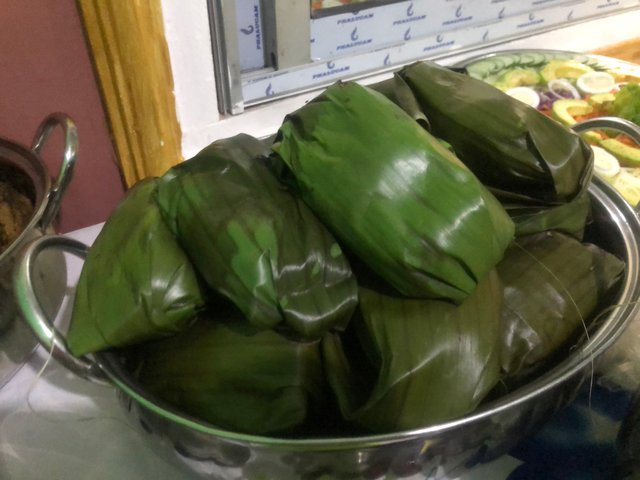
Step 5
Take your washed canda(cooked cowskin), and smoked meat. Boiled on high heat for about 45 minutes and taste when the meat is ready. Ensure to use enough water to boil because the water will be used to prepare the soup.
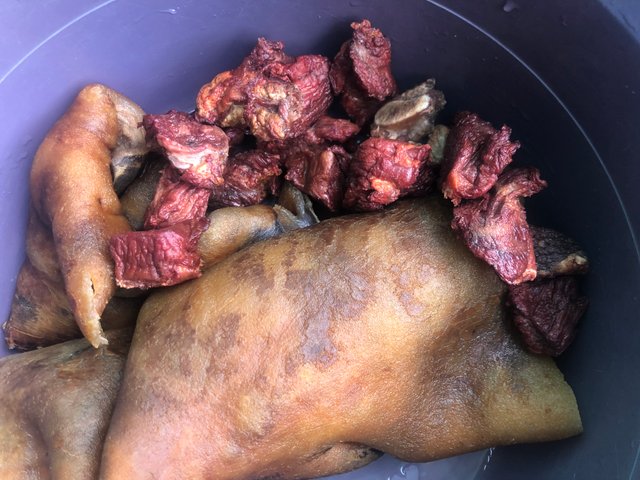
Step 6
Removed the meat and canda from the water and set aside. Put your limestone in a bowl and mix a bit of water. Drained the water from the limestone and put it in a pot of hot water. Mixed it until you get the required taste for the soup. The quantity of limestone depends on the quantity of soup you intend to prepare. Add palm oil to the already mixed water and limestone. Stir until you get the soup now yellow. The palm oil reaction with the limestone in hot water turns the soup yellow in colour. Add your salt and Maggie and finally add the grinded Achu spices to give it a unique taste. Cut your canda into desirable sizes with the boiled beef into the soup and stir. Your soup is ready.
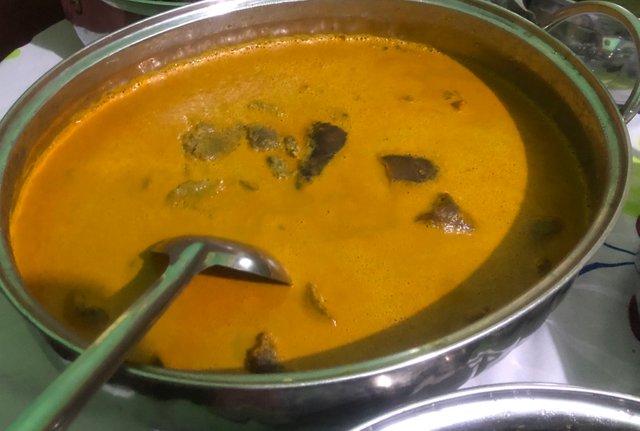
You can then serve yourself a plate of Achu and yellow soup by removing the Achu from the plantain leaves and put in a plate. Use an eating spoon to create a hole as a crater lake hehehe 🤪. Pour your soup into the Achu and place your meat around the plate. You might also want to add some vegetables to accompany the meat. It all gives you the village lifestyle treat you deserve 🤓.
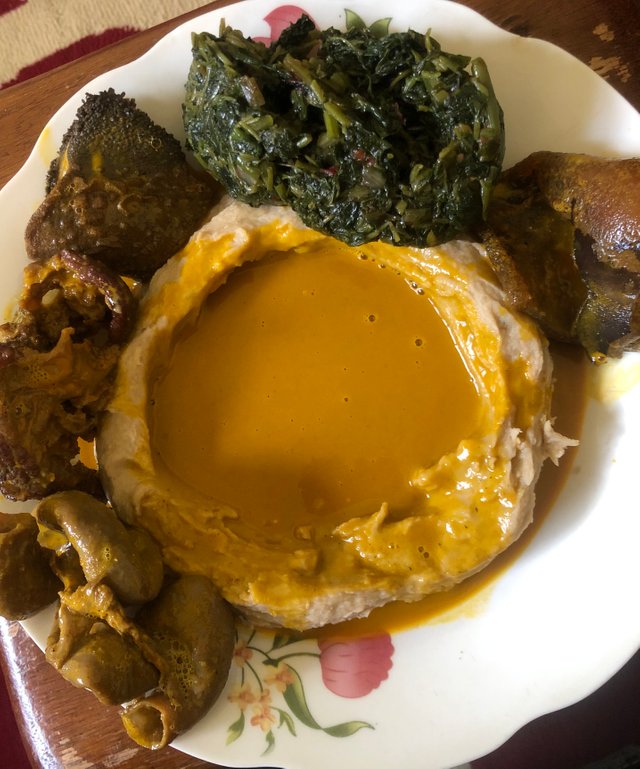
When this Delicacy is Often Prepared
Most often this delicacy is prepared during festivals, funeral celebrations, marriage celebrations or any other occasion that requires feasting.
However, some households prepare it any time they feel like eating it. This is mostly within the village set-up because they will easily harvest from the farm and cook.
In the cities, some people cherish cooking it on Sundays because they know that is the day many visitors gonna be around and should get a taste of the delicacy.
In sum, it is a delicacy most cherished by Cameroonians and is commonly found in restaurants around the country. Thank you for reading through and I hope it was worth your time.
Thank you, friend!


I'm @steem.history, who is steem witness.
Thank you for witnessvoting for me.
please click it!
(Go to https://steemit.com/~witnesses and type fbslo at the bottom of the page)
The weight is reduced because of the lack of Voting Power. If you vote for me as a witness, you can get my little vote.
Upvoted. Thank You for sending some of your rewards to @null. It will make Steem stronger.
Congratulations, your post has been successfully curated by Team 7 via @𝐢𝐫𝐚𝐰𝐚𝐧𝐝𝐞𝐝𝐲